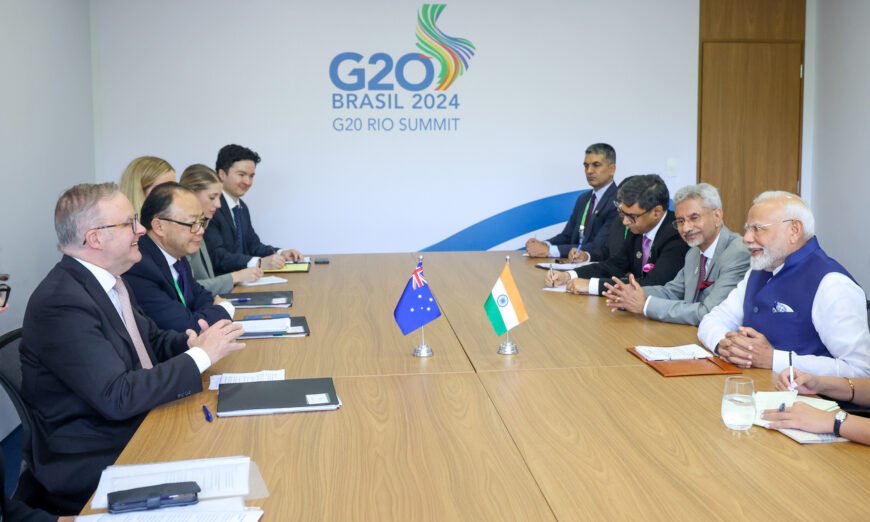The Hon’ble Prime Minister of India, Shri Narendra Modi, and the Prime Minister of Australia, the Hon Anthony Albanese MP, held the second India-Australia Annual Summit on the sidelines of the Group of 20 (G20) Summit in Rio de Janeiro on 19 November 2024.
Ahead of the fifth anniversary of the India-Australia Comprehensive Strategic Partnership in 2025, the Prime Ministers noted the significant progress made in strengthening bilateral ties across a range of important sectors – including climate change and renewable energy, trade and investment, defence and security, education and research, skills, mobility, science and technology, regional and multilateral cooperation, community and cultural links, and people-to-people ties.
Both Prime Ministers reflected on the shared interests of our region, noting with satisfaction that closer bilateral engagement has benefited both nations and the broader region. They welcomed sustained high-level contact and ministerial engagement between India and Australia. Looking forward, the Prime Ministers reaffirmed commitment to deepening cooperation and announced initiatives to focus and accelerate efforts for mutual benefit, as well as to promote the peace, stability and prosperity of our shared region.
Economy, Trade and Investments
The Prime Ministers expressed satisfaction at the increasing two-way trade, business engagements and market access for goods and services enabled under the landmark India-Australia Economic Cooperation and Trade Agreement (ECTA). They welcomed further work towards an ambitious, balanced and mutually beneficial Comprehensive Economic Cooperation Agreement (CECA), to realise the full potential of the bilateral economic relationship.
The Prime Ministers observed that ‘Make in India’ and ‘Future Made in Australia’ have complementarity and collaborative potential and could help create new jobs, unlock economic growth and secure our future prosperity in a changing world. The leaders called for greater two-way investments reflective of the Comprehensive Strategic Partnership and instructed officials to explore ways to realise greater synergies between the economies of both the countries and promote mutually beneficial investments in both directions.
Energy, Science and Technology, Space
India and Australia have shared ambition to move faster, work together and deploy our complementary capabilities to drive climate action. The Prime Ministers welcomed the launch of the India-Australia Renewable Energy Partnership (REP) which would provide the framework for practical cooperation in priority areas such as solar PV, green hydrogen, energy storage, two-way investment in renewable energy projects and allied areas; and upgraded skills training for the renewables workforce of the future.
The Prime Ministers noted progress under the Memorandum of Understanding between India’s Khanij Bidesh Ltd. (KABIL) and Australia’s Critical Minerals Office as an opportunity to grow commercial links and advance supply chain diversification interests. The leaders underlined the role of research and innovation, skills development, and professional exchange, including participation in each other’s conferences; and sustainable practices in developing the critical minerals sector in support of the global clean energy transition, including as inputs to technologies such as batteries and roof top solar.
The Prime Ministers welcomed the growing space partnership between the two countries, both at space agency and space industry levels. Cooperation to support the Gaganyaan missions, the planned launch of Australian satellites on-board an Indian launch vehicle in 2026 and joint projects between our respective space industries exemplify this deepening collaboration.
Defence and Security Cooperation
The Prime Ministers welcomed sustained progress under the defence and security pillar of the Comprehensive Strategic Partnership. They expressed intent to renew and strengthen the Joint Declaration on Defence and Security Cooperation in 2025, to reflect ambition in both countries’ elevated defence and security partnership and strategic convergence. The Prime Ministers looked forward to a long-term vision of defence and security collaboration between the two countries to enhance collective strength, contribute to both countries’ security and make an important contribution to regional peace and security.
The leaders appreciated the growing frequency and complexity of defence exercises and exchanges and the increasing interoperability through implementation of the Mutual Logistics Support Arrangement.
The Prime Ministers welcomed arrangements for enhancing maritime domain awareness, and increased and reciprocal defence information-sharing to deepen operational defence cooperation, address shared concerns and challenges, and work towards an open, inclusive, peaceful, stable and prosperous Indo-Pacific. They agreed to develop a joint maritime security collaboration road map. The Prime Ministers agreed to continue aircraft deployments from each other’s territories to build operational familiarity.
Education, Sports and People-to-People Ties
Recognising the strength of growing people-to-people linkages which continue to enrich our bilateral ties, the two leaders welcomed the significant contribution of Australians of Indian heritage and agreed to further strengthen this ‘living bridge’.
The Prime Ministers underlined that Sport offers significant opportunities to foster bilateral ties, enhance people-to-people links and cultural exchanges. They agreed to engage on capacity building, focusing inter alia on training and workforce development, sports science and medicine, and major sporting event management.
Regional and Multilateral Cooperation
The Prime Ministers reiterated their commitment to strengthening cooperation through the Quad as a force for global good which delivers real, positive and enduring impact for the Indo-Pacific, to advance their shared vision for a region that is free, open, inclusive and resilient. They appreciated the Quad’s ongoing efforts to undertake ambitious projects to help partners address pandemics and disease; respond to natural disasters; strengthen maritime domain awareness and maritime security; mobilise and build high-standard physical and digital infrastructure; invest in and benefit from critical and emerging technologies; confront the threat of climate change; bolster cyber-security; and cultivate the next generation of technology leaders. Prime Minister Modi looked forward to hosting Australia at the Quad Leaders’ Summit in India in 2025.
The Prime Ministers shared their positive assessment of the progress of bilateral engagements and affirmed their commitment to further and deepen ties for mutual benefit and for the benefit of the region. Acknowledging the significance of the approaching fifth anniversary of the Comprehensive Strategic Partnership, the Prime Ministers welcomed opportunities to commemorate this milestone in 2025in a befitting manner. They looked forward to the next India-Australia Annual Summit in 2025.

